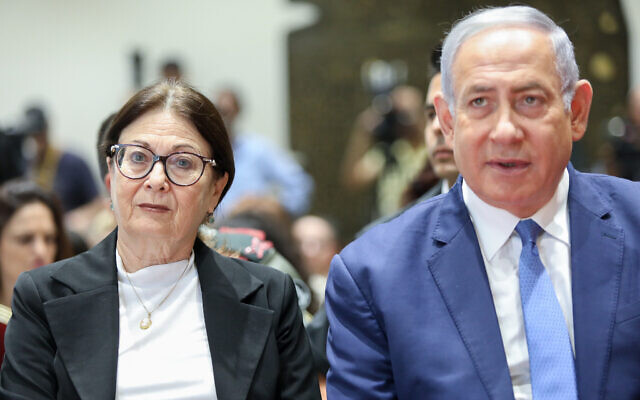National Unity party leader Benny Gantz on Friday urged Israelis from across the political spectrum to attend a scheduled anti-government protest the following day, as Prime Minister Benjamin Netanyahu’s hard-right coalition pushes ahead with plans to overhaul Israel’s judicial system.
Netanyahu, meanwhile, brushed off criticism of the proposed judicial changes a day after Supreme Court Chief Justice Esther Hayut warned their enactment would deal a “fatal blow” to the country’s democratic character.
In a video released before Shabbat, Gantz implored Israelis to attend the rally at Tel Aviv’s Habima Square on Saturday evening. A similar protest is also set to be held in Jerusalem.
The demonstrations will mark the second week that opponents of Netanyahu’s government will take to the streets, protesting Justice Minister Yariv Levin’s proposals to shake up the judiciary by severely curbing the High Court of Justice’s judicial review powers and cementing political control over the appointment of judges.
Saturday’s rallies are being backed by top groups that led protests against Netanyahu in 2020: Ein Matzav (No Way), Crime Minister and the Black Flags. They have also been endorsed by other organizations, including the Movement for Quality Government and the Kibbutz Movement.
Get The Times of Israel's Daily Edition by email and never miss our top stories
Critics of the plans, which include top current and former judicial and legal officials as well as Netanyahu’s political rivals, say Levin’s reforms would put basic civil and minority rights at risk by severely limiting the top court’s authority to strike down laws and government decisions. Proponents of the changes argue that the courts have assumed excessive powers and issued rulings that defy the will of the voters.
“I call on the entire Israeli public, from left to right, to come to protest for safeguarding Israeli democracy. Making your voice heard at this time is a civic duty of the highest importance and not ‘civil disobedience’ as those trying to suppress the demonstration claim,” said Gantz, who previously served as defense minister and IDF chief.

National Unity party head Benny Gantz speaks during a faction meeting at the Knesset in Jerusalem on January 9, 2023. (Olivier Fitoussi/Flash90)
Gantz earlier this week warned that the government’s planned judicial overhaul will lead to “civil war,” with Netanyahu subsequently claiming the National Unity chief was encouraging sedition. An ultranationalist coalition lawmaker later called for Gantz and opposition leader Yair Lapid to be arrested for treason, comments Netanyahu rejected.
In his statement Friday, Gantz urged demonstrators to behave “responsibly” and “refrain from violence and incitement.”
On Thursday, police warned against unrest at the upcoming rallies, citing intelligence indicating a “fear of riots.” No details were provided about the alleged concerns, which protest groups accused police of fabricating.
“I trust that the Israel Police will act properly and allow the freedom to demonstrate. We all need to heed [police] instructions,” Gantz said.
He ended his statement by saying: “Yes to [judicial] change with broad consensus, no to destruction and division.”
Last week, Gantz called for Netanyahu to put together a team with both coalition and opposition representatives to hammer out a judicial reform plan that would receive broad public backing. His proposal was brushed off, however, with neither Levin nor Netanyahu willing to take up his offer.
Along with Gantz, a number of other politicians were expected to attend the demonstration in Tel Aviv. Opposition leader Yair Lapid said Thursday that he would not join the protest after being told that he and Gantz would not be allowed to address the crowd.
According to Kan and the Ynet news site, police have barred protesters from marching or blocking roads as conditions for authorizing the rally in Tel Aviv. Several marches were held during last week’s protest, during which some demonstrators also briefly blocked a major highway.

Israelis block a bus during a protest against the Israeli government, in Tel Aviv, on January 7, 2023. (Tomer Neuberg/Flash90)
Also Friday, Netanyahu put out a video statement further defending his government’s planned judicial changes.
“We discussed this before the elections and we received a clear mandate from the public for this,” he asserted. “I suggest everyone calm down and enter into a substantive discussion.”
“When they say that the smallest reform is the destruction of democracy, this is not only a false claim, it also does not allow for the possibility to reach understandings… through substantive dialogue in the Knesset,” Netanyahu added.
The premier did not directly address the criticisms in Hayut’s speech, during which she argued Netanyahu and his government have no mandate to radically alter the judicial system.

Prime Minister Benjamin Netanyahu (right) and Supreme Court Chief Justice Esther Hayut at a ceremony at the President’s Residence in Jerusalem on June 17, 2019. (Noam Revkin Fenton/Flash90)
“Anyone who claims that the majority who elected their representatives to the Knesset were giving them a ‘blank check’ to do as they please, takes the name of democracy in vain,” she said Thursday.
Hayut also said the courts were crucial to ensuring “the rule of the majority does not turn into the tyranny of the majority.”
Her remarks drew a scathing rebuke from Levin, who accused her of siding with Netanyahu’s political rivals and claimed she was encouraging unrest, while Lapid and other opposition figures hailed her for speaking out.
On Wednesday, Levin published the first pieces of draft legislation aimed at completely restructuring the legal system as announced last week.
The overhaul will grant the government total control over the appointment of judges, including to the High Court, severely limit the High Court’s ability to strike down legislation, and enable the Knesset to re-legislate laws the court does manage to annul with a majority of just 61 MKs.


